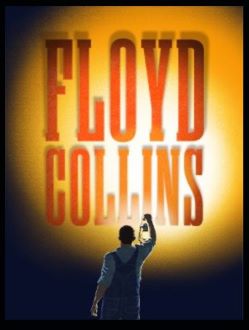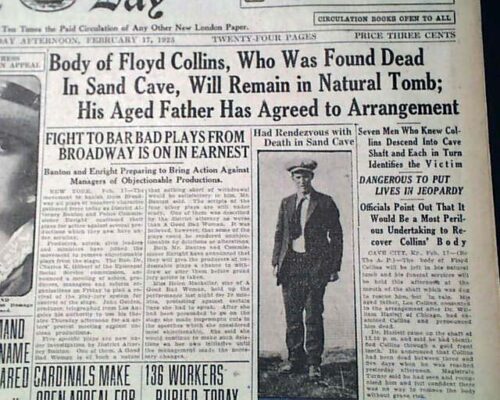I CAN’T CAVE ENOUGH
In 1917, Kentucky cave explorer Floyd Collins discovered Crystal Cave. Located in the same area as Mammoth Cave—the longest cave system known in the world—the site operated as a tourist attraction by his family. In 1925, while searching for a new entrance to the hundreds of miles of interconnected caves, Collins got his leg stuck in a narrow passageway 150 feet from the entrance. After a week, rescue efforts became increasingly difficult and dangerous when a passage used to reach Collins collapsed. With the advent of radio, the story and interviews with the trapped Collins by reporter “Skeets” Miller (who received a Pulitzer Prize for his coverage) became nationwide news. The ensuing unprecedented media circus drew to the site tens of thousands of tourists, who bought food and souvenirs from hawkers. After around 14 days, Collins died of exposure, thirst, and starvation. The attention to the story created a positive outcome, however, spurring the creation of Mammoth Cave National Park in 1941.
In 1994, this tragic tale became a musical.
Not just a musical, but a musical wherein the protagonist sings while supine for most of the show. And it works. But the most jaw-dropping accomplishment is the score itself, a rare mix of invention, originality, audaciousness, and accessibility that makes it one of the freshest and most attention-grabbing American musical scores of the last 40 years. Now, 100 years after Floyd’s death, and 30 years since the exciting, haunting musical played Off-Broadway at Playwrights Horizons in 1996, Floyd Collins—a profound shift in musical theater creation and execution—begins previews this week at Broadway’s Vivian Beaumont Theater at Lincoln Center, officially opening Monday, April 21, 2025. Do you understand how many theater queens have been salivating for the day that Floyd Collins came to Broadway?! So, anyone even remotely interested in musical theater, or any modern music for that matter, must head down (or up, depending on your subway) soon; musical theater aficionados have already been devouring tickets. I know someone who saw its world premiere at the American Music Theater Festival in Philadelphia in 1994, and still speaks of that performance.
And knowing the show as well as I do, the casting by The Telsey Office/Patrick Goodwin, CSA, is immaculate—a slew of our best musical theater artists: Jeremy Jordan as Floyd Collins, Jason Gotay as Homer Collins, Sean Allan Krill as H.T. Carmichael, Marc Kudisch as Lee Collins, Lizzy McAlpine as Nellie Collins, Wade McCollum as Bee Doyle, Jessica Molaskey as Miss Jane, Taylor Trensch as Skeets Miller, Cole Vaughan as Jewell Estes. Also on this cave tour are Kevin Bernard, Dwayne Cooper, Jeremy Davis, Charlie Franklin, Kristen Hahn, Happy McPartlin, Kevyn Morrow, Zak Resnick, Justin Showell, Colin Trudell, and Clyde Voce.
The Collins siblings Jeremy Jordan, Jason Gotay and Lizzy McAlpine
Original book writer (and additional lyrics) and director Tina Landau returns to helm. The composer/lyricist is Adam Guettel (rhymes with “metal”), grandson of Richard Rodgers, and the son of Mary Rodgers (Once Upon a Mattress). Guettel’s unconventional, risk-taking, complex, sophisticated score is difficult to categorize, as it goes from bluegrass to shifting rhythms to abstraction to a rip-roaring faux vaudeville number. In addition, Floyd Collins is uncommon because it doesn’t rotate around the topic of starry-eyed love. Instead, it is an allegorical tale of transcendence: Collins’ anguish ultimately causes purification, so beautifully rendered in “How Glory Goes” (sung by Audra McDonald on her same-titled 2000 CD). Because of these reasons, some of the critics and froth-favoring audiences were a bit stymied when it opened at Playwrights Horizon, and it played only 25 performances (which doesn’t say much to me: Most Sondheim musicals lost money on Broadway).
Composer and lyricist Adam Guettel
Fortunately, that’s all the time it took for people to notice that a profound shift in musical theater had occurred. New York Newsday: “One of the three or four truly great musical theatre scores of the decade.” Entertainment Weekly: “A vital new musical theatre writer has emerged.” Los Angeles Times: “Guettel is a composer for the new century.” Even the normally snarky John Simon wrote in New York Magazine: “This is the original and daring musical of our day… Floyd Collins reestablishes America’s sovereignty in a genre it created, but has since lost hold of. It is the modern musical’s true and exhilarating ace in the hole.” It also won the Lucille Lortel Award for Outstanding Musical, and an Obie for its score. (Guettel later cemented himself in the Broadway firmament for The Light in the Piazza, the 2005 musical that started—in an act of synchronicity—at Vivian Beaumont Theater.)
Charlie Franklin, Zak Resnick and Jeremy Davis
If you don’t trust awards or critics (I’m sure I don’t), Stephen Sondheim said in 1999 that he considered Floyd Collins one of the best musicals written in the last twenty-five years, and his list of “Songs I Wish I’d Written” includes “The Riddle Song,” which closes Act I.
It’s fascinating that Love Life, the 1948 Kurt Weill/Alan Jay Lerner musical—the full production of which staggered me as performed by Encores! last Sunday—did not get a cast album due to a musician’s strike, and the show disappeared into obscurity. Fortunately, the original cast album of Floyd Collins is legendary for capturing lightning (or a big lightning bug) in a bottle. Prior to Sweeney Todd (1979), the LP of which never left my turntable, there were many original cast recordings which sent an electric shock through my soul—that breathtaking moment when every sense is awakened upon hearing something that was unlike anything that ever came before. Since Les Misérables (1985, the only British Invasion musical that made me sit up and take notice), I can count on one hand the new scores that raised the hair on my neck. One was Michael John LaChiusa’s The Wild Party (2000). Another was Floyd Collins. Guettel’s unpredictable score, brilliantly orchestrated as if Stravinsky wrote American bluegrass by Bruce Coughlin (returning for the Broadway production), who utilizes Appalachian instruments such as harmonica, fiddle, banjo, and acoustic guitar. Original Musical Director Ted Sperling, one of the theater’s best, also returns to bring this unique score to life.
Music Director Ted Sperling and Orchestrator Bruce Coughlin
The sets are by dots, costumes by Anita Yavich, lighting by Scott Zielinski, sound by Dan Moses Schreier, and projections by Ray Sun, with dance sequences by Jon Rua.
Cast Principals
Floyd Collins first rehearsal photos by Chasi Annexy
Tina Landau with André Bishop, who steps down after 33 years as LCT's Artistic Director after this season
Floyd Collins
Vivian Beaumont Theater, 150 West 65 St at Lincoln Center
in previews since March 31, 2025; opens on Monday, April 21
for tickets, visit LCT


